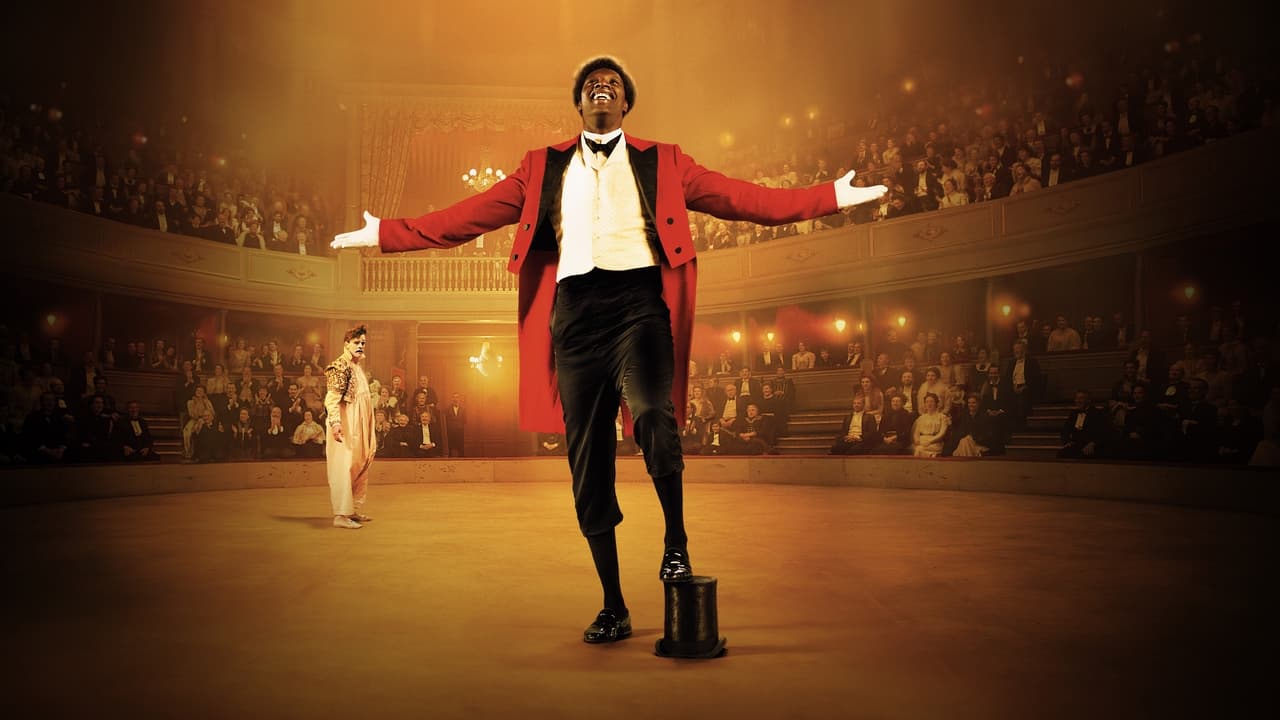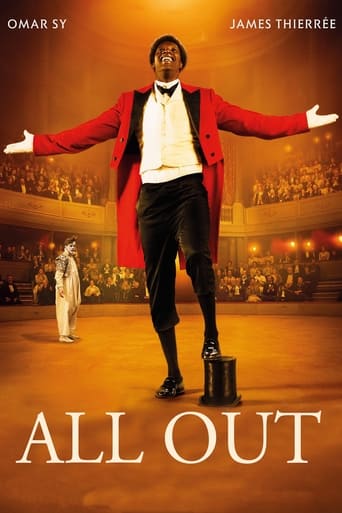SunnyHello
Nice effects though.
Skunkyrate
Gripping story with well-crafted characters
PiraBit
if their story seems completely bonkers, almost like a feverish work of fiction, you ain't heard nothing yet.
CineMuseFilms
Films about racism come in a variety of genres and styles. Most are essays in conflict and hardship so it is unusual to find one that is based on circus clowns and laughter. The traditional circus was a mirror of the race and class structures of society and audience response reflected social values. This theme overarches the delightful French film Chocolat (2016) that is based on the true story of the first black-skinned circus entertainer in 19th century Paris.A brief note on the history of clowns might help to see the deeper layers of this film. Dating to Greek and Roman theatre, the popularity of the clown's low-class buffoonery reflects the human need to occasionally step outside of the norms of society. Their costumes and personality codes vary widely from the European harlequin jester or comical fool to the American down-and-out hobo caricature. Traditional circus clowns perform slapstick comedy in pairs: the white-faced clown is the instigator of gags, the red-faced (or Auguste) clown is the victim or fall-guy. With centuries of tradition behind them, it was a cultural shock for French circus audiences to see a black-faced Auguste clown for the first time and terrifying to know that it was not black makeup.It is 1886 and the tired-looking Circus Delvaux is auditioning for acts to restore its fortunes. White clown George Foottit (James Thiérrée) is struggling to find work until he teams up with a former Cuban-negro slave with the stage name of Chocolat (Omar Sy). They quickly become a sensational duo, and the Delvaux circus prospers as crowds flock to see George kick, slap, and humiliate Chocolat. As their fame grows, Chocolat becomes the star celebrity and flaunts his success with flamboyant clothes, expensive car, gambling and substance abuse. Over time, Chocolat grows resentful of the racist taunts and abandons George for a career as a Shakespearean actor. Despite a credible performance as Othello, French audiences cannot accept a black person in serious theatre. With growing gambling debts and ill health, Chocolat ends his career in sadness and despair.There are so many engaging layers in this film. Both co-stars are brilliant in their roles and the detailed period sets exude authenticity. The behind-the-tent circus life is full of unusual and interesting humanity living in convoys of small caravans that move entertainers from town to town. From the perspective of the modern screen-reliant world, it is charming to see the physicality and humour of the lost art of circus slapstick comedy. While today's social conscience finds the blunt racism of a past era repulsive, this film reminds us of the ever-presence of race as a social divider. The appearance of black skin no longer shocks anyone but black talent is still the 'Auguste' in contemporary cinema.This multi-layered film has a nuanced mix of humorous entertainment, historical insight and contemporary relevance. While funny faces, staring eyes, and goofy slapstick struggles to draw loud laughter today, the dark message of Chocolat lies in its portrait of racism masked as humour.
AlexFalzon
Outside of a couple of small roles in Hollywood blockbusters X-Men: Days of Future Past and Jurassic World, I'd only ever seen Omar Sy in Intouchables, which was excellent, and in which he was excellent. He is also excellent in Chocolat (not to be confused with the 2000 film Chocolat, which is unrelated. Entirely.).Based on a true story (quite loosely, according to my very limited amount of research), Chocolat tells the story of a black man (Chocolat) who serves as a circus' "cannibal" before agreeing to partner with a famous, though struggling, clown named Foottit, in doing so becoming the first black clown to head an act in France. Their partnership quickly garners the attention and adoration of the country, and they're recruited into Paris' Nouveau Cirque, where their fame only continues to grow.The performances by Sy and his counterpart James Thiérrée (playing George Foottit) are captivating as the two men show us a relationship where both parties care deeply for each other even as they resent their mutual reliance. While we do get a taste for Foottit's own struggles outside of the circus, the majority of the film focuses on Chocolat's adjustment to the big city and the people who live in it. While he is ecstatic about how much money he is making and loves the spotlight, he lets fame go to his head, develops a gambling problem (when he's not wasting all of his money on trivial purchases), and endures the racism that comes from all directions, even from his most devoted fans. Eventually he decides on a bold change of career.Where the film let me down was in its disjointedness; the film leaps ahead many times, as biopics are wont to do. However, each time we leap ahead, the film leaves behind an element of the story, never to be seen again. We are left to assume, I suppose, that the problems still present at the culmination of one time-period have been settled by the time the next begins. This is a film without any sense of resolution, which, while adding to its tragic nature, also left me feeling unsatisfied as the credits began to roll. What happened to all of the other characters we met along the way? Why make such a big deal out of them if they mattered so little to the story?Outside of the performances, which, again, were stellar, I also very much enjoyed the music, editing and cinematography. The film was put together very well in all technical aspects, even utilising some archive footage right at the end which was very touching.I'm not sure that it's a film I'd recommend to the everyday movie- goer, due to its confusing storyline-abandonments and its general deviation from historical fact, but it is one that I'd recommend to fans of Omar Sy (and James Thiérrée, who, by the way, is the grandson of Charlie Chaplin, and this adds another element of entertainment to his physical antics). Chocolat is a poignant tragedy about the rise and fall of an incredibly gifted individual and the partner with whom he shared fame.alexfalzon.com - for more reviews.
Luiza Martins
I watch this movie in the last week in a cinema festival in my city called "Festival of Cinema Francês Varilux". The reasons who motivated me to see this movie was the circus theme, which pleases quite my particular taste, and I not regretted it one bit having assisted. The story based on real events was very well represented by their respective actors, and shows a clear way the difficulties and prejudices suffering black people in society in general during the nineteenth century. It's exciting and makes us us to reflect about the life of the clown Chocolat. I really enjoyed, is engaging and exciting. Script, scenery and costumes simply perfect. You feel in time the film is over, the places makes you travel centuries in the past. It seems that every detail has been thought out thoroughly, just impeccable.
Nozz
We should care about performers for what they do, not for who they are and certainly not for who their family is, but I couldn't help it. I went to see CHOCOLAT because the actor playing second lead is Charlie Chaplin's grandson. And even if I'd been expecting Charlie Chaplin's reincarnation, I wouldn't have been disappointed. As the movie introduces his character, he does a tour-de-force of solo clowning that's jaw-dropping. Later on, the movie focuses rather more on the title character as he and the second lead make a revolutionary pairing of the white clown and the Auguste in the same act. We don't quite get an explanation of what the traditional white clown and the traditional Auguste are, but we do get a vivid, picturesque depiction of 19th- century France and a pretty strong story line.

